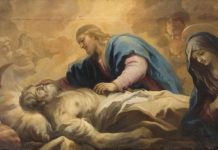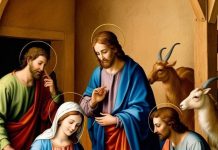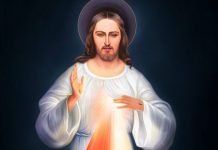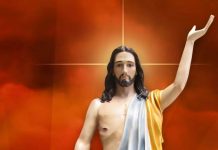‘On the last day of the festival, the great day, while Jesus was standing there, he cried out, “Let anyone who is thirsty come to me, and let the one who believes in me drink. As the scripture has said, ‘Out of the believer’s heart shall flow rivers of living water’ “. Now he said this about the Spirit, which believers in him were to receive; for as yet there was no Spirit, because Jesus was not yet glorified ( Jn 7: 37-39).
What did we get out of the passion, crucifixion and resurrection of Jesus Christ? Assurance of salvation, institution of the sacrament of Eucharist, establishment of the Church as the sacrament of salvation and finally the pouring down of the Holy Spirit are the most important results of Christ’s sacrifice and subsequent glorification. Without any doubt, we can say that the fulfilment of the promise to send the Holy Spirit was the best part of it. As John says, the glorification of Jesus was a condition to be fulfilled before the pouring down of the Spirit. It does not mean that the Holy Spirit was something new, that was introduced into history at a particular point of time. The Holy Spirit was there in the Triune God before ages, before anything was created. In fact the first book of the Bible starts with a reference to the Holy Spirit.
‘In the beginning when God created the heavens and the earth, the earth was a formless void and darkness covered the face of the deep, while a wind from God swept over the face of the waters’ (Gen 1:1-2). The wind that was present, even before the earth took shape and heavens were created, refers to the Spirit of God. The Hebrew root of the word translated as ‘wind’ can be translated as spirit also. The Spirit of God which we call the Holy Spirit was active before creation, is still active, and will be with us till the end. In the Old Testament we see examples of persons upon whom the Holy Spirit came. But they were for specific purposes and sometimes for specified time periods.
We read about Samson; ‘The spirit of the Lord began to stir him in Mahanehdan, between Zorah and Eshtaol’ (Judg 13:25). With the help of the Spirit, Samson did many great things, but unfortunately in a later time it so happened that Lord’s spirit left him without Samson even knowing it. This ultimately led to the Philistines seizing him. Only when the Holy Spirit leaves a man that he understands what he really lost. David knew it. That is why he prayed to God for retaining the Spirit within him. ‘Do not cast me away from your presence, and do not take your Holy Spirit from me’ (Ps 51:11). On a personal level he knew what would become of a man, who once bestowed with the Holy Spirit, but later deprived of it. He had the example of Saul, the first king of Israel before him. ‘Now the Spirit of the Lord departed from Saul, and an evil spirit from the Lord tormented him’ (1 Sam 16:14). It is interesting to read on. The remedy that Saul’s servants advised him was to bring somebody who was skillful in playing the lyre. This was how David got introduced to Saul. Whenever the evil spirit from God came upon Saul, David took the lyre and played it with his hand, and Saul would be relieved and felt better and the evil spirit would depart from him.
You might be thinking; ‘So it is easy to get rid of evil spirits. Just bring somebody who is skilled in playing the lyre and the evil spirit will depart!’. Before jumping into such conclusions we should remember that nowhere in the Bible we see any other person who casts out evil spirits with a lyre. Then what was special about David and his lyre? Well, we should have started reading the passage from a little behind. ‘Then Samuel took the horn of oil, and anointed him (David) in the presence of his brothers; and the Spirit of the Lord came mightily upon David from that day forward’ (1 Sam 16:13). David was an ordinary man and his lyre was also an ordinary one. But when the spirit of the Lord started working in David his lyre started producing notes of deliverance. This is exactly what the Holy Spirit does. The Holy Spirit empowers us to do many many things that are beyond our human power. It is apt to say, ‘it is the Spirit that gives life, the flesh is useless’ (Jn 6:63). David knew it and this was sufficient reason for him to be scared of the possibility of the Holy Spirit leaving him when he committed two mortal sins in a row and then tried to hide them.
It is in God’s plan that His Spirit dwells in those in whom He is pleased and enables them to know His will. In the Book of Wisdom we read; ‘Who has learned your counsel, unless you have given wisdom and sent your Holy Spirit from on high?’ (Wis 9:17). As we know, only those who fulfill the will of the Heavenly Father will enter the gates of eternal life. And to know what God’s will is, we need the help of the Holy Spirit. We see the scattered thoughts about the Holy Spirit recorded in the Old Testament days, developing into its fullness in the teachings of Jesus. In his conversation with Nicodemus, one thing Jesus emphasises is the need of being born of water and Spirit. “Very truly, I tell you, no one can enter the kingdom of God without being born of water and Spirit’ (Jn 3:5). After explaining the need of a second birth in Spirit, Jesus tells him about two kinds of persons, or rather two categories into which the whole of mankind could be grouped. They are those born of flesh and those born of Spirit. How is it possible to distinguish between them? According to Jesus it is very easy. ‘What is born of the flesh is flesh and what is born of the Spirit is spirit’ (Jn 3:6). We cannot expect a better, simpler answer.
Now it is time for us to introspect. Are we flesh born of flesh? Or spirit born of Spirit? This distinction is all that makes a Christian different from others. Before leaving this world, Jesus promised his disciples that he will send the Holy Spirit upon them. Unlike in the past when the Spirit was given to specific persons for specific assignments and for a specific period, the promise of Jesus was wider in its scope and reach. Now onwards it is going to be a full scale anointing of the Holy Spirit upon those who believe in Jesus. ‘………He gives the Spirit without measure’ (Jn 3:34).
It is a mystery that much before Jesus taught his disciples about the Holy Spirit, he taught others about this power coming from on high. We have seen how Nicodemus was instructed about the Holy Spirit during his private and secretive meeting with Jesus that was held at night. Again during his encounter with the woman of Samaria, Jesus offers her the ‘spring of water gushing up to eternal life’. It was during his final hours on this earth that Jesus taught his disciples about the Holy Spirit that they were going to receive after his ascension. Jesus promises to send the Spirit as an Advocate to be with them forever. Not everybody can receive this Advocate, because the world neither sees him nor knows him. This being the Spirit of Truth, it is natural that a world that is founded in falsity and flourishing in lies cannot receive it. Blessed are those who are found worthy to receive this Spirit of Truth. Jesus says; ‘You know him, because he abides with you, and he will be in you’ (Jn 14:17).
The purpose of sending the Holy Spirit was to see that the disciples of Jesus are not left orphaned. Jesus’s tenure here was surprisingly short and he knew that there are many more things to be taught to his disciples and he left this task to the Holy Spirit. ‘But the Advocate, the Holy Spirit, whom the father will send in my name, will teach you everything, and remind you of all that I have said to you’ (Jn 14:26). To be specific, Jesus tells them three areas where the Holy Spirit will instruct them. ‘And when he comes, he will prove the world wrong about sin and righteousness and judgement: about sin because they do not believe in me; about righteousness, because I am going to the Father and you will see me no longer; about judgement, because the ruler of this world has been condemned’ (Jn 16:8-10). Jesus who himself is truth says; “When the Spirit of truth comes, he will guide you into all the truth…’ ( Jn 16:13). This is something very important, because Jesus is telling us that to get the fullness of truth about Jesus, we need the help of the Holy Spirit. Without it, whatever we learn of Jesus will be an incomplete and futile academic exercise. When Jesus says that no one can come to Jesus unless he is drawn by the Father who sent Jesus here, it means that a special intervention of the Father is needed for us to know the real Jesus. This special grace is being given to us through the Holy Spirit.
Around us, we see many people – Christians included – keep Jesus in high esteem because he was a good man, a social reformer, a revolutionary, a person who preached love and one who was the manifestation of mercy. They stop short of admitting that Jesus Christ is the only Son of God and that he is the only way, only truth and only life that we can bank upon. Those who ignore this most important part of the mystery called Jesus, will not and cannot reach the fullness of truth. They will stumble on their way. They fail in their attempt to know the real Jesus because they did not seek the help of the Holy Spirit. Paul explains the role of the Holy Spirit in helping us to understand Jesus and what he achieved for us. ‘Therefore I want you to understand that no one speaking by the Spirit of God ever says “Let Jesus be cursed!” and no one can say “Jesus is Lord” except by the Holy Spirit’ (1 Cori 12:3). In this sense the Holy Spirit acts as the foundation of our faith, because our faith is based on the belief that Jesus Christ is Lord.
Many people understand the Holy Spirit at a conceptual level only, ignoring the fact that the Holy Spirit is a person, though it is incomprehensible to us, mortals. Since the flesh is useless and the Spirit is all powerful, we need the help of this Spirit with us at all times to do anything good. The Holy Spirit happily resides in our body, says Paul. ‘Or do you not know that your body is a temple of the Holy Spirit within you, which you have from God, and that you are not your own?'(1 Cori 6:19). It is in the fineness of things that we should never offend a valued guest staying with us. As prudent men we will see that our guest is comfortable as long as he stays with us. In the case of the Holy Spirit, he is a guest for the whole life, unless of course we tell him to vacate. The Bible tells us not to offend the Holy Spirit who has marked us for the day of salvation.
Paul defines the true meaning of worship in terms of this lifelong partnership of the Holy Spirit with us. “I appeal to you therefore, brothers and sisters, by the mercies of God, to present your bodies as a living sacrifice, holy and acceptable to God, which is your spiritual worship’
( Rom 12:1).
On the day of first Pentecost after the Resurrection, the disciples were filled with the Holy Spirit. The Church was officially inaugurated on this day. Since then every Christian receives the same Holy Spirit at the time of their baptism. This anointing is rekindled every time we receive sacraments, especially the sacraments of Holy Eucharist and Confession. We, the Church, are living between two Pentecosts, the second to come soon and to which we eagerly look forward. To those who open their eyes, this is the time for preparing ourselves for the second Pentecost. The Blessed Virgin in many of her messages and apparitions has mentioned about this second Pentecost, a powerful pouring out of the Spirit on mankind.
Living between two Pentecosts means that we are given the freedom to emulate either Saul the King or Saul the Apostle. One lost his anointing by his own deeds. As a result he got tormented by an evil spirit and died a violent death. Another, delivered from everything worldly and filled with the Holy Spirit. He became Paul and lived in the constant company of the Holy Spirit.
What does a life in the Spirit look like? We have some examples from the Book of Acts. First is of Philip who was guided in each step while preaching the gospel. The Holy Spirit told him what to do, how to do and when to do. Once his mission was accomplished, we read that the Spirit carried him to another destination. ‘When they came up out of the water, the Spirit of the Lord snatched Philip away; the eunuch saw him no more, and went on his way rejoicing. But Philip found himself at Azotus and as he was passing through the region, he proclaimed the good news to all the towns until he came to Caesarea’ (Acts 8:39-40). For those who are on Lord’s mission, the Holy Spirit will take care of everything from logistics to supplies. They just need to surrender themselves to the guidance of the Spirit. And for a man who comes in contact with them will continue their life rejoicing, like what the eunuch did.
In the case of Stephen who was filled with the Holy Spirit, he could gaze into heaven even during times of severe physical assault on him by an enraged mob. ‘But filled with the Holy Spirit, he gazed into heaven and saw the glory of God and Jesus standing at the right hand of God. “Look,” he said, “I see the heavens opened and the Son of Man standing at the right hand of God!” (Acts 7:55-56) We know what happened next. They stoned him to death but not before he prayed for his enemies! Stephen’s example tells us that a person filled with the Holy Spirit will be able to fix his eyes on a life beyond death even at times of severe adversities. He will give testimony to Jesus even while surrounded by enemies fully knowing that his life is at stake. He will pray for those who persecute him. It is impossible and unimaginable for us to think that an ordinary man like us could behave in this way. Left to himself, Stephen would not have done all these things. It was the Holy Spirit who helped him by giving the necessary graces.
This Spirit is not up for sale. This was the costly lesson Simeon the magician learnt when he offered Peter money for getting the anointing of the Holy Spirit. Think of the folly of Simeon who tried to buy something that comes totally free. But before pointing our accusing fingers at Simeon, think of our own folly in not taking full advantage of the free gift of the Holy Spirit that our Saviour promised us. Think of our folly in not utilising the powers of this perennial companion in fighting the spiritual war, deep into which we are now. Think of our folly in forsaking the fountain of living water and digging out cracked cisterns for us that can hold no water, as Jeremiah lamented.
These are days of which Joel prophesied: ‘Then afterward I will pour out my spirit on all flesh; your sons and your daughters shall prophesy, your old men shall dream dreams, and your young men shall see visions. Even on the male and female slaves, in those days, I will pour out my spirit’ (Joel 2:28-29).
It is worth remembering the parting words of Paul addressed to the church in Ephesus. ‘And now, as a captive to the Spirit, I am on my way to Jerusalem, not knowing what will happen to me there, except that the Holy Spirit testifies to me in every city that imprisonment and persecutions are waiting for me’ (Acts 20:22-23). Are we ready to let ourselves be captive to the Spirit? If so, the Spirit will take us to the New Jerusalem, the City of God. Though perils and persecutions are sure to come, the surest thing is that the Holy Spirit will never let us down in this pilgrimage.
With this fervent hope, let us prepare for the second Pentecost and pray with the Blessed Virgin.

















